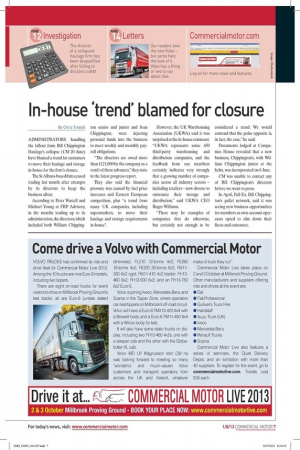In-house 'trend' blamed for closure ADMINISTRATORS handling the fallout from
Page 5

If you've noticed an error in this article please click here to report it so we can fix it.
Bill Chippington Haulage's collapse (CM 20 June) have blamed a trend for customers to move their haulage and storage in-house for the firm's closure.
The St Albans-based firm ceased trading last month after attempts by its directors to keep the business afloat.
According to Peter Wastell and Michael Young at FRP Advisory, in the months leading up to its administration, the directors, which included both William Chipping ton senior and junior and Joan Chippington, were injecting personal funds into the business to meet weekly and monthly payroll obligations.
"The directors are owed more than £121,000 by the company as a result of these advances," they state in the latest progress report.
They also said the financial pressure was caused by fuel price increases and Eastern European competition, plus "a trend from many UK companies, including supermarkets, to move their haulage and storage requirements in-house". However, the UK Warehousing Association (UKWA) said it was surprised at the in-house comment. "UKWA represents some 650 third-party warehousing and distribution companies, and the feedback from our members certainly indicates very strongly that a growing number of companies across all industry sectors — including retailers — now choose to outsource their storage and distribution," said UKWA CEO Roger Williams.
"There may be examples of companies that do otherwise, but certainly not enough to be considered a trend. We would contend that the polar opposite is, in fact, the case," he said.
Documents lodged at Companies House revealed that a new business, Chippington's, with William Chippington junior at the helm, was incorporated on 6 June.
CM was unable to contact any of Bill Chippington's directors before we went to press.
In April, Pall-Ex, Bill Chippington's pallet network, said it was seeing new business opportunities for members as own-account operators opted to slim down their fleets and outsource.









































